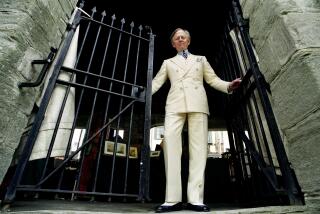‘Scandal’ Faces Another Shock --an X-Rating
- Share via
In bringing “Scandal” to the screen, the iconoclastic Palace Productions had to overcome church objections, threatened lawsuits and widespread opposition to the notion of raking up the details of a sex scandal that toppled a British government more than a quarter century ago.
But now, just as “Scandal” is gaining popularity in British theaters, its producers face an even bigger hurdle: the Motion Picture Association of America has made the rare decision to tag it with an X-rating.
If the rating stands, it could seriously undermine the film’s audience potential in the United States, where it is scheduled to open April 28. Miramax Films, which is distributing “Scandal” here and abroad, would have difficulty finding theaters to book it in and newspapers that would accept its advertisements.
“We were shocked to say the least,” said Harvey Weinstein, chairman of Miramax Films. “While this is a movie about sex, we never thought it was an X-rated film.”
Weinstein added that his company plans to investigate its legal rights--MPAA ratings may be appealed--and doesn’t intend to cut an orgy scene that he believes was the cause of the X-rating. “We’re not going to take this sitting down,” Weinstein said.
The MPAA does not publicly disclose the details behind its ratings decisions. Under MPAA rules, the producers of “Scandal” can edit what they believe to be the offending scene and resubmit the film for a less restrictive rating. Or they can appeal the MPAA decision to the association’s appeals board, which has different members than the ratings board.
The steamy film is set in the 1960s, when the Beatles’ “Please, Please Me” was on the top of the charts, Swinging London was about to be marketed to the world, and Britain’s biggest political sex scandal was buzzing around Fleet Street, the Old Bailey and the House of Commons.
The Profumo Scandal finished the conservative government of Harold Macmillan, helped usher in a new Labor prime minister, Harold Wilson, and gave the world a good look at life underneath England’s stuffed shirts.
The complex story centers around Stephen Ward, an osteopath who liked to introduce pretty young women to prominent men. Christine Keeler and Mandy Rice-Davies were two of the women Ward took to licentious parties, where they met--and sometimes slept with--officials in attendance.
War Minister John Profumo and Soviet operative Yevgeny Ivanov were among Keeler’s lovers. When asked about Keeler in the House, Profumo twice lied. When his lies were exposed, he resigned from politics. Ward was subsequently charged with living off the immoral earnings of women and committed suicide while his Old Bailey trial was in progress.
John Hurt plays Ward, whom the film portrays as a victim of a hypocritical establishment. Joanne Whalley-Kilmer plays Keeler and Bridget Fonda is Rice-Davies, two sensation-seekers from the suburbs who got in over their heads. Ian McKellen plays Profumo.
“Scandal” challenges the conventional recollection of the affair by treating Ward sympathetically. And it has angered those who feel Profumo, now 73, has been punished enough for his indiscretions. Once considered a potential prime minister, Profumo has spent the ensuing years doing penance. For his work with charities in London’s impoverished East End, he was given a coveted government decoration.
Out of deference to his feelings, the British establishment has always protected his privacy.
But given the scandal’s irresistible elements--philandering politicians, call girls, Soviet spies and a sex party attended by a naked man in a mask who is rumored to be a member of the Royal family (the scene which prompted the X rating)--it was news destined for dramatization. And “Scandal” producer Stephen Wooley isn’t apologizing.
“Why should we lay off . . . because this guy who lied in the House of Commons is still alive?,” asks Woolley, combatively. “Just because his friends still run the country? They use this cry--’He’s suffered enough’--to cover up something else, I’m not quite sure what. Hypocrisy is what this film is about.”
Whatever the reason, British audiences have given “Scandal” a respectable--though not ecstatic--box office reception since it opened there earlier this month. The film grossed $1.9 million at 210 screens during its first week. That’s not as strong a performance as big U.S. movies such as “Rain Man,” “The Accused,” or “Naked Gun” are logging, but “Scandal” is “more than holding its own” against the competition, according to Daily Variety, the Hollywood trade publication.
The pony-tailed young producer of “Mona Lisa,” “The Company of Wolves” and “Absolute Beginners” (in which the now middle-aged Mandy Rice-Davies played a cameo role), says he previously attempted to package the Profumo story as a three-part TV miniseries.
“We developed it for the British Broadcasting Corp., but the people there couldn’t get it past their board,” Wooley said. “We took the script to all of the commercial television companies and everybody thought it was great but they couldn’t afford to upset so many people.”
A principal source for “Scandal” is a 1987 book, “An Affair of State: The Profumo Case and the Framing of Stephen Ward,” by British writers Phillip Knightley and Caroline Kennedy.
“There’s no question that the British Establishment (has) closed ranks to make telling this story difficult, and that they tried to get the BBC not to do it,” BBC producer David Wickham said. “But that isn’t the reason the BBC isn’t doing it. I made the decision because we couldn’t prove the Knightley-Kennedy book’s thesis: that there was a conspiracy from the top to nail Stephen Ward.”
The political implications of the affair and the film are uppermost in the minds of English people, but Americans may be more interested in the personal stories “Scandal” tells. By pre-buying “Scandal,” distribution newcomer Miramax is betting a substantial portion of the film’s $7 million cost that Americans will want to see what Woolley calls a “Pygmalion turned Frankenstein” scenario.
“Christine Keeler was looking for glamour, fun and adventure, and she found it after she met Stephen Ward,” says Joanne Whalley, who was last seen as a medieval heroine in “Willow.” “I think Christine is a sympathetic character. She was not a prostitute, as has been alleged. She was involved in things you could hardly call innocent, but she was very young. She slept with a lot of men, which was shocking to admit then, but it isn’t actually that big a deal.”
Bridget Fonda, Peter Fonda’s daughter, was a last-minute replacement for Emily Lloyd.
Fonda is quick to defend Rice-Davies.
“A lot of people thought she was a hooker because she dated men who were well off,” she said, in an English accent. “But she and Christine were just in it to have a good time. Remember, she was just 16 when she came to London. Mandy didn’t feel she had anything to be guilty about. It was her candor that made her sound like a bad girl.”
Political sex scandals are more common in Britain than in America. There have been two major hanky-pankies while Margaret Thatcher has been prime minister. In one, a minister’s mistress announced she was bearing his child. In the other, a Thatcher adviser successfully sued a newspaper for libel after it wrote that he had given money to a prostitute.
“One of the reasons we’ve taken a lot of abuse for making this film,” said producer Woolley, “is that there are quite a few parallels that might embarrass the present Tory government. Exposing the hypocrisy of Tories isn’t popular here at the moment.”
More to Read
The biggest entertainment stories
Get our big stories about Hollywood, film, television, music, arts, culture and more right in your inbox as soon as they publish.
You may occasionally receive promotional content from the Los Angeles Times.










